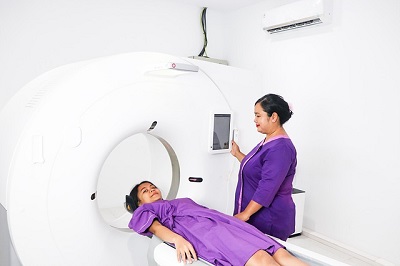What Are The Symptoms of Thoracic Endometriosis
Endometriosis may not be an unfamiliar term to many women. Generally, endometrial cells are supposed to grow inside the uterine cavity. Still, for specific reasons, these cells may wander away from home and appear in other parts of the body, such as the ovaries and the pelvic peritoneum, forming endometriosis.

However, when endometriosis occurs in the thoracic cavity, it forms thoracic endometriosis, a relatively rare but potentially severe condition.
So, what are the symptoms of thoracic endometriosis?
The symptoms of thoracic endometriosis are varied, and their appearance is often closely related to the menstrual cycle. The following are some common symptoms:
1. Chest Pain
Chest pain is one of the more common symptoms of thoracic endometriosis. When the ectopic endometrial tissue undergoes periodic bleeding with the menstrual cycle, it stimulates the pleura, leading to chest pain. This pain may be unilateral or bilateral, and its nature can vary from stabbing to distending or dull, with the intensity differing from person to person.
Chest pain symptoms may begin one to two days before menstruation, peak during menstruation, and gradually subside until disappearing after the menstrual period ends. Chest pain may persist regardless of the menstrual cycle if the condition is more severe.
2. Hemoptysis
When ectopic endometrial tissue invades the lungs' small blood vessels or alveoli, menstrual bleeding may lead to hemoptysis. The hemoptysis can vary from small amounts of blood-streaked sputum to significant quantities of coughing-up blood.
It is important to note that hemoptysis does not necessarily occur with every menstrual cycle, and some patients may not exhibit hemoptysis symptoms in the early stages of the disease, only developing them as the condition progresses.
3. Dyspnea
Suppose ectopic endometrial tissue forms a large lesion in the thoracic cavity, or repeated bleeding results in complications such as pleural effusion or pneumothorax. In that case, it can compress the lung tissue, affecting its ventilation and gas exchange functions and causing dyspnea.
Patients may experience rapid breathing, shortness of breath, and chest tightness, with dyspnea symptoms worsening after physical activity.
4. Pneumothorax
When ectopic endometrial tissue invades the alveoli or small bronchi on the surface of the pleura, bleeding during menstruation may cause them to rupture, allowing air to enter the pleural cavity and resulting in pneumothorax.
Patients may suddenly experience chest pain, dyspnea, and coughing. Severe pneumothorax can lead to complications such as mediastinal shift and shock.
5. Pleural Effusion
Repeated bleeding of ectopic endometrial tissue in the thoracic cavity causes blood and exudate to accumulate in the pleural cavity, forming a pleural effusion.
Small amounts of pleural effusion may not have apparent symptoms, but as the amount increases, patients may experience chest pain, dyspnea, and coughing. The nature of pleural effusion is often bloody. Through thoracentesis and fluid analysis, red blood cells, endometrial cells, and other components can be found.
It is important to note that the symptoms of thoracic endometriosis can vary due to individual differences. Some patients may exhibit only one or a few of these symptoms, and these symptoms can easily be confused with other pulmonary diseases such as pneumonia, tuberculosis, and lung cancer.
Suppose female patients repeatedly experience chest pain, hemoptysis, dyspnea, and coughing during menstruation, especially those with a history or family history of endometriosis. In that case, they should promptly seek medical attention for a definitive diagnosis.
Early diagnosis and treatment are crucial for improving patients' prognosis and quality of life. The herbal medicine Fuyan Pill has a unique effect on the treatment of endometriosis. It can promote blood circulation, improve blood supply to the lesions of ectopic endometrial tissue, and help alleviate pain and masses caused by bleeding and adhesions of the ectopic endometrial tissue.
You may also be interested in:
Where Can Endometrial Tissue Ectopically Occur?
Why Do Some Endometriosis Patients Experience Hip Pain?
Excessive Night Sweating? It Could Be Related to Endometriosis
Where Can Endometrial Tissue Ectopically Occur?
previous pageWhat to Do About Endometriosis? Try These 4 Methods
next pageTestimonials
- Adenomyosis with Ureaplasma Urealyticum Cured by Fuyan Pill
- Tubal blockage with hydrosalpinx can be cured by TCM shortly
- Fuyan Pill Helps A woman with Adenomyosis Get Pregnant
- A Woman with Hydrosalpinx Is Cured with Fuyan pill
- Pelvic Inflammatory Disease Testimonials
- Irregular Vaginal Bleeding and Endometrial Thickening Cured by Fuyan Pill
- Pruritus Vulvae and Frequent Urination: Mycoplasma Infection Cured after 2 Courses



